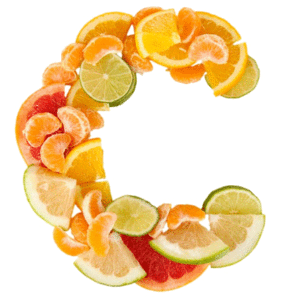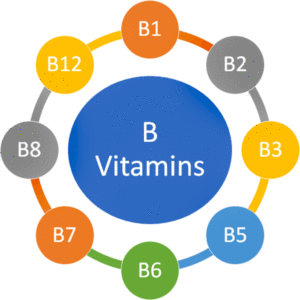Last week’s post launched the discussion of vitamins, those chemically active agents that are required to promote our health and growth. As noted, our bodies are unable to produce these life-sustaining substances on their own. With the exception of Vitamin D, we must take them in through food or supplements. This week, we’ll focus on water-soluble vitamins.
 Vitamin C has been a popular dietary supplement ever since Dr. Linus Pauling (two-time Nobel prize winner in biochemistry) touted its benefits decades ago. As discussed in an earlier post, Vitamin C protects cells from incursion by viral agents and bolsters the efficacy of infection-fighting leucocytes. This powerhouse of a vitamin serves many other important functions.
Vitamin C has been a popular dietary supplement ever since Dr. Linus Pauling (two-time Nobel prize winner in biochemistry) touted its benefits decades ago. As discussed in an earlier post, Vitamin C protects cells from incursion by viral agents and bolsters the efficacy of infection-fighting leucocytes. This powerhouse of a vitamin serves many other important functions.
According to nutritionist Roberta Anding, Vitamin C aids in the synthesis of carnitine which transports long-chain fatty acids into the cellular mitochondria for energy production. It’s needed for the synthesis of collagen, norepinephrine, peptide hormones, and tyrosine, an amino acid. It also supports iron absorption, and helps strengthen cartilage, bone, and teeth.
The recommended daily dose of Vitamin C is far lower than that suggested by Dr. Linus Pauling and can be obtained by eating 5-7 servings of fruit and vegetables daily. Vitamin C deficiency results in a condition called scurvy characterized by swollen, bleeding gums, joint pain, and fatigue. Scurvy was prominent among poorly nourished sailors at the end of the 18th century; it’s rarely found in the developed world.
 The B vitamins work as a team to promote healthy nerves, skin, eyes, hair, liver, muscle tone, and cardiovascular function. They typically serve as coenzymes, triggering important chemical reactions that would not occur without their presence. They are found in fresh fruits and vegetables, nuts, legumes, seafood, and organ meats. Excess alcohol consumption proves detrimental to the bioavailability of B vitamins and may result in disease.
The B vitamins work as a team to promote healthy nerves, skin, eyes, hair, liver, muscle tone, and cardiovascular function. They typically serve as coenzymes, triggering important chemical reactions that would not occur without their presence. They are found in fresh fruits and vegetables, nuts, legumes, seafood, and organ meats. Excess alcohol consumption proves detrimental to the bioavailability of B vitamins and may result in disease.
Vitamin B1 (thiamin) helps break down the food we eat into sugars and amino acids. Thiamine needs an acidic environment for absorption and is damaged in the presence of heat. Thiamine deficiency results in one of two forms of disease. Wet beriberi affects the heart and circulatory system; dry beriberi damages nerve tissue.
Vitamin B2 (riboflavin) helps break down proteins, fats, and carbohydrates during digestion. It’s destroyed by ultraviolet light, hence the use of opaque containers for supplements. Excess riboflavin shows up as a distinctive yellow tinge to excreted urine. A deficiency results in ariboflavinosis as evidenced by mouth ulcers, cracked lips, dry skin, and sore throats. It may also be associated with anemia and itchy, watery, or bloodshot eyes.
Vitamin B3 (niacin) participates in the action of over 200 metabolic processes. Its deficiency brings on pellagra, a disease characterized by dermatitis, diarrhea, tremors, and mental disturbance. Niacin has been prescribed by physicians with patients who have been unable to control their cholesterol through stains, exercise, or diet. However, a high dose of niacin can result in flushing, rapid heartbeat, itching, nausea, diarrhea, liver damage, and elevated blood sugar. In short, it’s not a vitamin to be trifled with on one’s own.
Vitamin B5 (pantothenic acid) has been associated with the proper functioning of the adrenal glands as well as cell metabolism and cholesterol production. It’s found in organ meats, egg yolks, and whole grains. Some naturopaths prescribe pantothenic acid to combat stress. Deficiencies tend to be associated with acute malnutrition.
Vitamin B6 (pyridoxine) supports healthy brain, nervous system, and immune function. It is destroyed by heat and may be toxic in excess quantities. A deficiency may result in declining oral health, weakened immune function, fatigue, tingling in the hands and feet, and seizures.
Vitamin B7 (biotin) supports processes to metabolize fats, carbohydrates, and proteins. Deficiencies are rare but can lead to hair loss, skin problems, lethargy, impaired immune function, and other symptoms.
Vitamin B9 (folic acid) is a popular supplement for pregnant women as it has been known to prevent birth defects and support good spinal development. It’s an important coenzyme that builds the body up, bolsters immune function, supports red blood cell division, combats depression, among other functions. Good sources of folate include leafy greens, green beans, mushrooms, brown rice, lentils, cauliflower, and peas. While 50-67% of folate is bioavailable from foods, it is vulnerable to heat.
Vitamin B12 (cobalamin) is needed to produce red blood cells, maintain the central nervous system, and support DNA synthesis. When bound to food, it is released by hydrochloric acid and protease in the stomach. Because stomach acidity decreases with aging, folks over age 50 may be subject to malabsorption. Animal products are the primary source of Vitamin B12. Vegetarians and vegans may need B12 supplements or risk anemia and/or nervous disorders.
Check with your doctor or a trusted government resource to determine the recommended daily allotment of these vitamins based on your age and overall health. Let your doctor know about any supplements that you take regularly.